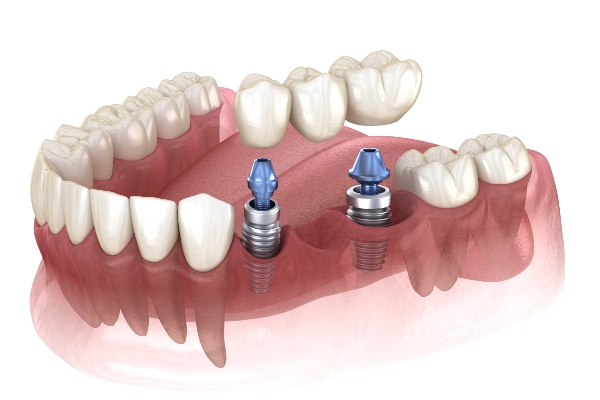 Dental implants are a viable solution for replacing missing teeth. Unlike their temporary alternatives that require adhesives or frequent maintenance, dental implants are durable and permanent, mimicking the function and durability of natural teeth. Discover everything you need to know before choosing this option to restore your smile.
Dental implants are a viable solution for replacing missing teeth. Unlike their temporary alternatives that require adhesives or frequent maintenance, dental implants are durable and permanent, mimicking the function and durability of natural teeth. Discover everything you need to know before choosing this option to restore your smile.
What are dental implants?
A dental implant is an artificial tooth root consisting of biocompatible materials such as titanium (most popular) or zirconia. The oral surgeon will surgically place the implant into the jawbone, where it fuses with the bone through a lengthy but necessary process called osseointegration. After full integration, a customized crown, bridge, or denture is attached to the dental implant, creating a functional, natural-looking finish.
Ideal candidates
While dental implants are the preferred tooth replacement option by many dental professionals, patients must undergo a comprehensive evaluation checking for adequate amounts of bone density and volume, gum health, and underlying medical conditions.
Bone density and volume
Adequate bone volume and density amounts are necessary to support the dental implant. However, insufficient amounts of bone do not automatically deny a patient's candidacy; the oral surgeon may recommend a bone graft or sinus lift to aid efforts before placing the dental implant.
Gum health
Dental implants require healthy gum tissue for successful integration. If one has gum disease, it can hinder the healing process and lead to the rejection of an implant, known as implant failure.
Underlying medical conditions
Certain medical conditions, such as an autoimmune disorder or diabetes, can greatly impact the body's healing process and increase risks during surgery and recovery. Patients need to review any underlying medical conditions with the oral surgeon to ensure the utmost safety precautions.
The dental implant procedure
The dental implant process takes several stages due to its invasive nature. After the consultation, which is the approval process, the oral surgeon will want to move quickly to the first phase, as the entire process can span upwards of nine months.
Phase one involves tooth removal, bone grafts, and sinus lifts if necessary, though this will not be the case for every patient. The oral surgeon will place the dental implant for those who do not require any of those services. Depending on the number of implants placed, the patient will be under local or general anesthesia. They will make an incision in the gum line and create a hole in the jawbone before anchoring the implant into place before moving into phase two.
Phase two is osseointegration, allowing time for the dental implant to fuse with the bone properly. This stage is the most lengthy portion of the process, taking three to six months to complete. Phase three involves the patient returning to have their gum line reopened for the abutment to securely attach to the implant. Fortunately, the following healing phase only lasts a couple of weeks. If able, the oral surgeon may take impressions of the patients to have their custom restorations crafted and returned to the office by their final phase.
The final phase consists of the patient returning to have their custom restorations attached to the abutment. This phase will not require any drilling or incisions, but the oral surgeon will spend time explaining to the patient how to properly care for the dental implants so that they may last a lifetime.
Permanently restore your smile
Undergoing the dental implant process is a rewarding decision and a great investment. However, you need proper guidance to increase your chances of success. That is why we are here. Contact us today to get approved for candidacy and begin restoring your smile.
Request an appointment or call Great Lakes Oral Surgery at 734-961-4864 for an appointment in our Ann Arbor office.
Related Posts
Dental implants are the gold standard of dental replacements. Titanium rods and porcelain crowns are the most stable dental replacements you can get. Once osseointegration ends, you will have a strong, stunning smile again. Knowing the advantages of dental implants can motivate you to see your dentist about getting these restorations. Here are the three…
Dental implants are often the preferred choice for patients and dental providers for single-tooth replacement. Unlike dentures and bridges, implants provide a long-lasting tooth replacement solution that most closely mimics the function and appearance of a natural tooth. Understanding the importance of single-tooth replacement and the benefits implants can offer to the right candidate will…
Dental implants support permanent artificial teeth, making them a popular alternative to dentures. Dental implants require oral surgery, providing a durable, effective, and natural-looking tooth replacement. If you are considering implants, preparing for the postoperative period can make for a much smoother recovery.Dental implants are biocompatible metal or ceramic posts inserted into the jaw. They…
